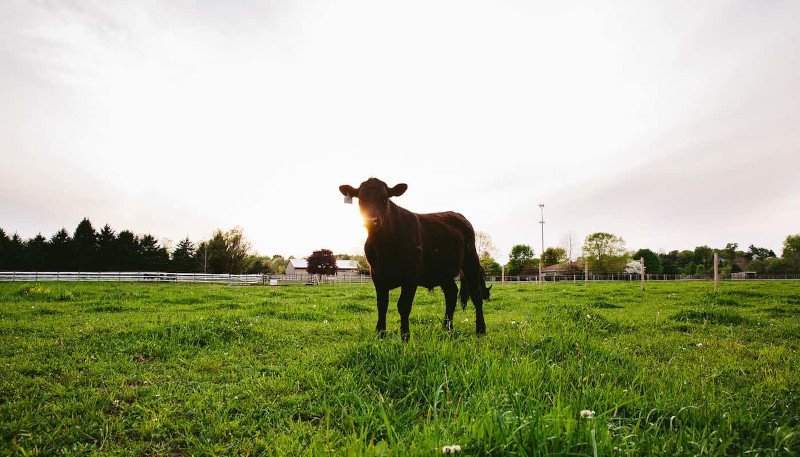
Do more of what you love to grow your business, and let Clover do the rest.
Find out what our solutions can do for your business. Contact us today to see how Clover can meet your needs.

Clover: Hello Hendrick, thanks for speaking with us today. Can you share a little about your background in cattle farming?
Hendrick Leibrandt: I am a third-generation farmer. I grew up working on my granddaddy’s farm in South Africa, where we raised lamb and beef primarily. I immigrated to the United States at age 19 and settled on a farm in northeast Ohio. For many years, my wife and I used the property mainly to run a horse business, offering riding lessons and boarding. Around eight years ago, we noticed that several of our customers were struggling to find locally produced, organic, and inexpensive protein. This seemed absurd to me. How can livestock that comes from nature, lives in nature, and is fed by nature be so expensive? Armed with my family’s farming knowledge, I decided to start raising a small number of cattle, initially just for my friends and neighbors. This endeavor ultimately grew into Destiny Farm Cattle.
Clover: Why do you think cheap, organic protein is so difficult to find in grocery stores?
Leibrandt: I think farming practices have changed dramatically in recent decades. I find that people in Ohio are more into “fast farming,” as I call it, versus a traditional farming method. Small farms have become less profitable as large-scale, highly commercialized farming operations have taken over the market. Typical factory farming practices—like putting tons of corn in front of the cattle and cramming them into crowded feedlots—demonstrate a deeper concern with quantity over quality. By selling at high volume, these operations undercut small farms and push farmers like me to sell their products at higher cost. These differences seem to represent a generational shift, in my opinion. I’ve noticed many older farmers in my community also take issue with today’s fast farming approach.
Clover: What distinguishes how you raise your livestock compared to a large-scale farm?
Leibrandt: My approach may seem “old school” by modern standards. We prioritize humane and sustainable farming methods that are as close as possible to nature. The cattle graze on rotational grass pastures and hay that are naturally fertilized and pesticide-free. They are not given any antibiotics, hormones, or steroids. We believe that anything that comes from nature should agree with your body because we all—humans as well as animals—come from nature. We keep our cows happy and healthy by providing consistent access to sunlight, fresh air, and clean water. Unlike big farms that prioritize the price per pound above the animal’s quality of life, we choose to give our cattle plenty of time outdoors so they can have proper Vitamin D intake, fresh air, and freedom of movement. We also consider the quality of the water the cows drink to be very important. Our cows drink water from a spring-fed source.

Clover: There’s no doubt that your customers appreciate your commitment. When did you first open the retail element of Destiny Farm Cattle?
Leibrandt: Our store’s grand opening was in June 2019. We sell products from our own farm, as well as from other local farms, including lamb, chicken, pork, milk, eggs, butter, and jams. We try to practice the “local” message we preach by selling only local products in the store.
Clover: What made you choose Clover as your point-of-sale system for the store?
Leibrandt: I was initially drawn to the affordability of Clover. We saved a lot on fees when we switched from our previous POS. I also appreciate the user-friendly interface of Clover’s products. Since our store is still new and growing, the portability of the Clover Flex suits our needs well. I like that I can easily enter online and phone orders into the Flex, then pull up the order when the customer comes into the store. Also, most of our product is sold by the pound, so the Clover helps us tally up orders efficiently.
Clover: We’re happy to hear that. How has the Covid-19 pandemic affected your business?
Leibrandt: The pandemic, among other things, has created a more health-conscious consumer. People want to know that their food is healthy, and part of that process is understanding where their food comes from. As I’ve said, Destiny Farm Cattle offers a healthier alternative at a lower price for people compared to typical grocery store products. Specifically, our grass-fed beef is high in zinc and omega-3 fatty acids while being low in saturated fat. In addition to the health benefits of our products, our small store allows for greater social distancing than a crowded supermarket.
Clover: What advice do you have for other small business owners?
Leibrandt: First, I’d say remember that customer service is king. Don’t underestimate the power of kind words and good service in establishing your base of repeat customers.
Even more importantly, focus on yielding the best product possible and believe in your product. Our commitment to and belief in local products has inspired our customers to reconsider their own consumer practices. Supporting your local community and collaborating with other small operations creates a stronger network of sustainable farming for the future. We cannot take on the factory farming operations alone, but as a group of small business owners, we can create a better future for our communities.
I would also like to say that I think it’s great how Clover helps promote small businesses with this blog. We look at Clover as a big industry and it’s easy to feel like the big guys don’t care about the small guys. But you guys understand that a lot of small businesses are what make you big. As a small business, we appreciate that.

Find out what our solutions can do for your business. Contact us today to see how Clover can meet your needs.